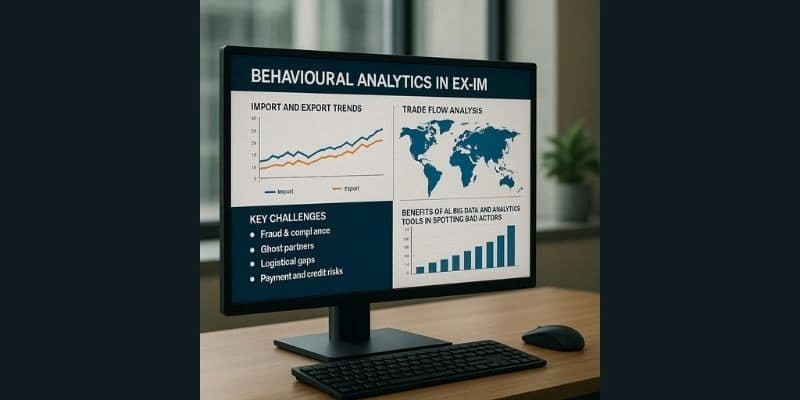Fraud-Proofing Trade: The Rise of Behavioural Analytics in Ex-Im

New Delhi [India], May 27: Global trade has shifted from word-of-mouth deals to data-driven strategies. Today, companies rely on import-export data and visualisation platforms to plan shipments and vet partners. Accuracy is now ensured by sophisticated tools driven by AI that compile years’ worth of India’s import and export data as well as international customs records from sources like the WTO and shipping manifests. Such trade analytics dashboards turn raw trade data into clear charts and maps, revealing credible buyers and suppliers at a glance.
In short, real-time trade data and dashboards give exporters/importers insights into market trends and trusted connections that manual methods simply cannot provide.
Table of Contents
Key Challenges: Common trade issues without proper data analytics
- Fraud & compliance: Absence of robust data tools increases vulnerability to scams like fake invoices and phantom shipments.
- Ghost partners: Many B2B platforms list unverified entities, leading to wasted efforts on unreliable contacts.
- Logistical gaps: Lack of visibility into shipping routes can result in unexpected delays and supply chain disruptions.
- Payment and credit risks: Not assessing a partner’s payment history may lead to defaults and costly recoveries.
Spotting Scams Through Trade Flow Analysis
Data analysis brings these risks into the open. Examining a company’s historical trade data and patterns can reveal anomalies. For example, a partner with a consistent, stable export profile over many months is typically low-risk, whereas one with irregular or explosive order volumes is a red flag. Trade analysts use such benchmarks for risk profiling. They look for deviations in a firm’s trade “habits”: sudden spikes in shipment volume, unexpected new products, or shipments to unusual destinations.
This screening approach catches many fraud schemes. For example, mismatches between declared goods and customs codes often indicate invoice fraud or smuggling. Detecting a shipment with no matching buyer history or a surging imports-from-India volume without precedent would instantly alert analysts. In practice, firms can then halt questionable transactions or demand extra guarantees.
Benefits of AI, Big Data, and Analytics Tools in Spotting Bad Actors
Modern analytics engines leverage AI to sift through colossal import-export datasets. The Dollar Business’s EX-IM platform, for example, “processes millions of Ex-Im datasets in nanoseconds”, delivering up-to-date, accurate trade intelligence. It provides detailed profiles of buyers and suppliers, including each company’s historical purchase “habits”, so abnormal behaviour stands out. In effect, each firm’s trade history becomes a fingerprint: any deviation can be algorithmically flagged. The Ex-Im engine covers 21 million active companies across 181+ countries, giving it a global view of trading networks.
As a result, users (import-export firms worldwide) can continuously screen partners against this vast dataset. AI-driven habit-based screening means that if a trading partner suddenly orders ten times its usual volume, the system immediately raises an alert. In this way, analytics tools protect exporters and importers by automating the vetting process, saving time, and catching threats that humans alone might miss.
IBM Food Trust (Blockchain for Transparency): In the food industry, shared data platforms are proving the value of transparency. IBM’s Food Trust, a blockchain network for suppliers and retailers, illustrates this vividly. By logging each product’s origin and movements on a shared ledger, participants gain unquestionable provenance. For example, a Walmart-IBM pilot on mangoes cut the time to trace a shipment’s origin from seven days to just 2.2 seconds. This dramatic gain in traceability shows how data sharing (via blockchain) brings trust: no one can secretly substitute or steal goods without detection. Similar systems are now tracking hundreds of produce, meat, and dairy products, ensuring quality and rooting out fraud in real time.
Future Outlook
In the future, fighting trade fraud will rely more on technology. Experts say that artificial intelligence (AI) and predictive analytics will become common tools for both exporters and importers. Companies will also use real-time data. This means they can see changes in trade patterns as they happen, like sudden changes in tariffs or political issues in other countries. Another tool gaining popularity is blockchain. This technology keeps records that can’t be changed. It helps make sure all trade activities are honest and follow the rules.
By 2030, many global trade platforms will have built-in tools that detect fraud. AI will check every container, invoice, and payment. This new way of doing trade will make the global market much safer. Fraud will be easier to catch, and dishonest players will have a harder time hiding their tricks.
The Dollar Business EX-IM Platform
The Dollar Business is a trade intelligence company serving exporters and importers worldwide. Its flagship offering, the EX-IM platform, is an AI-driven trade data engine and marketplace. The platform’s database contains over 21 million verified companies across 181+ countries. Subscribers can query this “Export Import Data Bank” for any product (by HS Code) and instantly see all past trade partners, volumes, prices, and more. In effect, EX-IM is a supercharged import/export analytics tool: businesses use it to find new markets, analyse competitors, and verify prospects. By drawing on sources from WTO stats to customs filings, the platform turns raw export data and import data (for example, Import Export Data India) into actionable insights. Many import-export firms rely on it to navigate the export-import business efficiently and to avoid the pitfalls of trade fraud.
For more information, please visit: https://in.thedollarbusiness.com/




